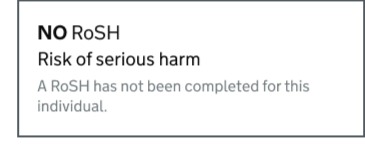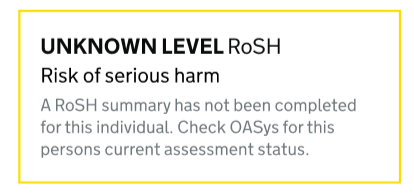Community components Risk RoSH widget Edit

Overview
The widget shows a summary of the Risk of Serious Harm (RoSH) level for an individual.
Why is the component needed
The widget uses information from the legacy OASys risk assessment system to populate a mini-table showing:
- the individual’s overall RoSH level (low, medium, high, or very high)
- when the RoSH assessment was last updated
- the level risk posed to specific groups or classes of potential victims
- the area (community or custody) in which a particular risk level exists for each group or class
When to use
Probation staff Prison staff (where the services overlap or individuals pass between them) 3rd party suppliers of services (for example, interventions providers)
help users quickly see an individual’s overall RoSH score help users quickly see an individual’s RoSH score for each group/class of potential victims in different contexts make it easier for users to rapidly understand risk information without navigating away from their immediate task support third parties who provide services in their assessment of risk (for example, interventions providers receiving a new person on probation)
Use this component/pattern to help users… quickly absorb and interpret the risk of serious harm posed by an individual develop a picture of the individual and their risks and needs share and reuse risk information in a standard way with consistent meaning Types of scale and call-out for each risk tool: The information is presented in table form. The RoSH level is set by the probation practitioner based on a clinical assessment and the application of their professional judgement. It uses words rather than numbers. The words used are ‘low’, ‘medium’, ‘high’ and ‘very high’ and these are given unique and consistent colours.
Display both 'custody' and 'community' - when the user would find it beneficial to see both Display 'custody' only - when a user needs to only understand risk information in the context of a person in prison Display 'community' only - when a user needs to only understand risk information in the context of a person on probation in the community Display 'No RoSH' - when a Risk of Serious Harm assessment has not been completed for an individual
## How the component has been used
When using this component or pattern, what should be considered when it comes to: Establishing the potential victims Based on OASys data, the categories of potential victims are:
- children
- public
- known adult
- staff
- prisoners
- The potential contexts are:
- community
- custody In any given case, one or more classes of potential victims may be excluded and not all risks will be present across both community and custody. Use N/A for any empty values.
No RoSH

Unknown RoSH

Unable to obtain the RoSH

Accessibility issues
Unpaid work DAC audit:
DAC Accessibility Report WCAG 2.1 - MOJ - Unpaid Work Assessment - Final (1).pdf
Screen Magnification(Usability)
When the screen is magnified to 200%, the box overlaps the text on the page.
FIXED - Breakpoints added for smaller screen sizes
Deciding if someone should be recalled or not - Accessibility issue
https://uv2854-moj-making-recall-decisions.uservisionaccessibility.co.uk/content-spills-out-of-container-on-ipad-l.html
Resolved
Research
NO RoSH is now UNKNOWN LEVEL RoSH Users of The Community payback assessment were assuming NO RoSH = LOW RoSH. Research showed that this is not always the case. A user can exempt themselves from completing a RoSH summary in OASys and therefore no level is assigned.
When UNKNOWN LEVEL is because no RoSH summary has been completed we use a yellow outline along with "A RoSH summary has not been completed for this individual. Check OASys for this persons current assessment status."
When UNKNOWN LEVEL is shown due to the system not being able to obtain the RoSH (whether it's there or not) We use the Grey outline along with the text "Something went wrong. We are unable to show RoSH information at this time. Try again later."
The use of UNKNOWN LEVEL rather than NO RoSH creates a little more uncertainty over RoSH and should encourage a user to double check OASys to understand the person on probations risk of serious harm.
The Grand High Council of Risk UI - December 2022
https://miro.com/app/board/uXjVPH939-Y=/?share_link_id=481664550142
No major user problems identified un UR for RoSH component
Services used
Community Payback Assessment - Public Beta
Refer and monitor an intervention - Accommodation referral - LIVE
Manage a workforce - Public Beta
Deciding if someone should be recalled or not - Public Beta
Approved Premises - Alpha
Mange POM cases - Public Beta
Contribute to the community discussion
The MoJ Design System team would like to hear:
- how you have used this component
- any feedback you have about its usage, for example accessibility or ideas for improvement
Add these comments to the risk rosh widget discussion on Github.